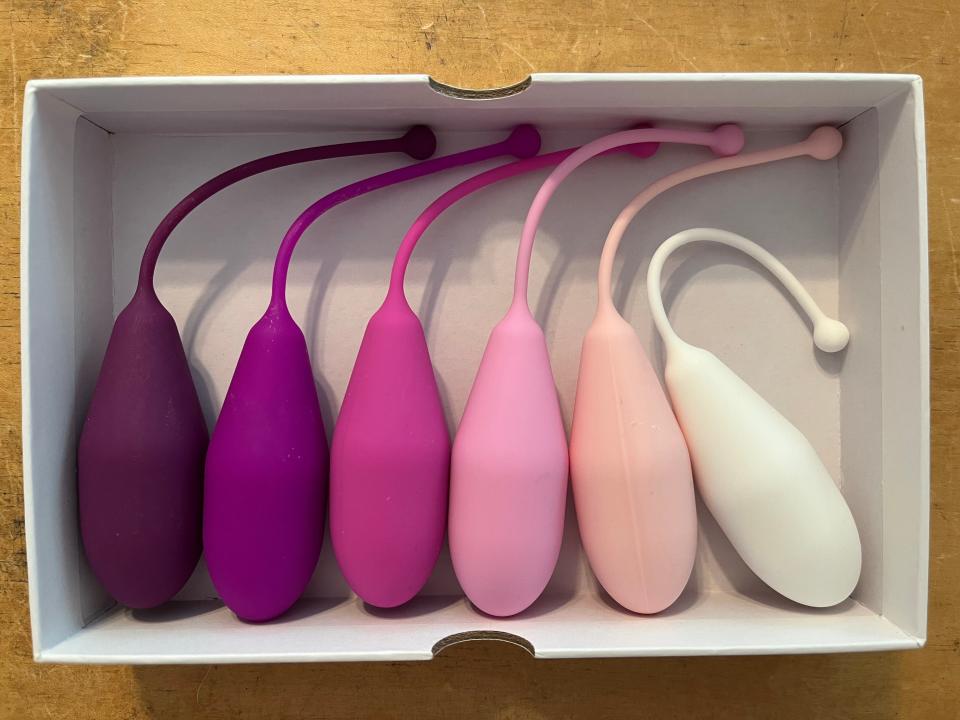I was diagnosed with pelvic organ prolapse. I want other women to know it's common and not to feel ashamed.
Three years ago I felt a bulge every time I wiped after going to the bathroom.
I was diagnosed with pelvic organ prolapse.
A urologist told Insider that 30% to 50% of women will have some form of prolapse.
About three years ago, I began to feel something strange. When I went to the bathroom, I would occasionally feel a large lump protruding out when I wiped. I was perplexed and a little bit worried. My immediate assumption was that somehow my cervix had fallen and was trying to make its way out of my body, but I convinced myself this wasn't the case.
For the next few months, I did my best to ignore it. After all, I wasn't in pain; there didn't seem to be an issue apart from when I was going to the bathroom; the world was essentially shut down because of COVID, and to be frank, I was embarrassed.
I eventually texted a good friend who is an OB/GYN and explained what was happening. She got back to me immediately, letting me know that it sounded like pelvic organ prolapse, or POP, and that despite the scary-sounding name, it was actually fairly common and most likely not a huge problem.
What is pelvic organ prolapse?
With her reassurance bolstering me, I made an appointment with a urogynecologist who eventually diagnosed me with POP — a condition where organs in the pelvis, such as the uterus, bladder, or rectum, drop down from their usual positions and can bulge outside the vagina.
In my particular case, I have a rectocele, which happens when the supportive wall of tissues between the rectum and vaginal wall weakens. What I had been feeling wasn't my cervix after all but the back of my vaginal wall. Since then, I've experienced a range of related symptoms, from the occasional bladder leak during a hearty cough or sneeze to a strange feeling of heaviness in the area right before my period is about to begin.
Before my diagnosis, I had never heard of POP, let alone knew what a rectocele was. And I'm not alone.
"Often patients are in fear that they have cancer or some sort of tumor, " Andrea Pezzella MD FPMRS of Southern Urogynecology LLC in West Columbia, told Insider. "They may know a little about prolapse, but they feel like something's actually going to fall out of them. When I reassure them that it is not cancer and that it will not fall out— they are quite relieved," she said.
Pezzella says that while 30% to 50% of women will have some form of pelvic organ prolapse, only about 15% of patients will be seen for the problem since they are symptomatic. I may have had a mild version of POP for years until it started getting worse.
Pelvic organ prolapse treatment
After I was diagnosed, I was referred to physical therapy in the hopes of stalling any further progression. I had no idea what to expect. My only previous experience with PT was for a bout of sciatica and mostly included cat and dog yoga stretches and some ab workouts.
When it came time for PT for my vagina, it was actually fairly similar. In my case, I have an underlying hypermobility syndrome which causes my ligaments to no longer support my vaginal wall as strongly as before, so my physical therapist had me work on strengthening the muscles surrounding the ligaments. I perfected my kegel routine as well as did some weight training. I got a series of vaginal weights and would perform a variety of exercises with them each day.

Physical therapy has worked so far, as has learning more about my condition. I am mindful of how much weight I carry — doing my best not to lift heavy loads, particularly up stairs — ensure that I eat plenty of fiber so I have smooth bowel movements that won't cause me to bear down, which worsens prolapse, and I've become comfortable with occasionally needing to pop my POP back up into my body manually. However, depending on the severity, others may need more intensive treatment.
I share my diagnosis to help others going through the same
But none of this helps if we're not talking about it. FEMSelect, the women-led company, wants to start more conversations about prolapse so those experiencing it feel less alone and less stigmatized. "Our goal is to foster greater awareness and understanding of pelvic organ prolapse and encourage women to speak up around this difficult topic, ultimately improving the healthcare provided to women affected by this condition," said Debbie Garner, co-CEO of FEMSelect.
When you find yourself feeling embarrassed and alone, despite up to 50% of women experiencing the same condition, something has to change. Thankfully, I found a couple of online groups of folks dealing with POP. We share support, suggestions, and more than the occasional laugh.
Three years into my own diagnosis, I've become a POP evangelist of sorts. I've shared my diagnosis freely and openly, letting folks know that it's no different than most health conditions and that we shouldn't be shamed into silence. Hopefully, by talking about it, I can help others feel less alone, and less embarrassed.
Read the original article on Insider

